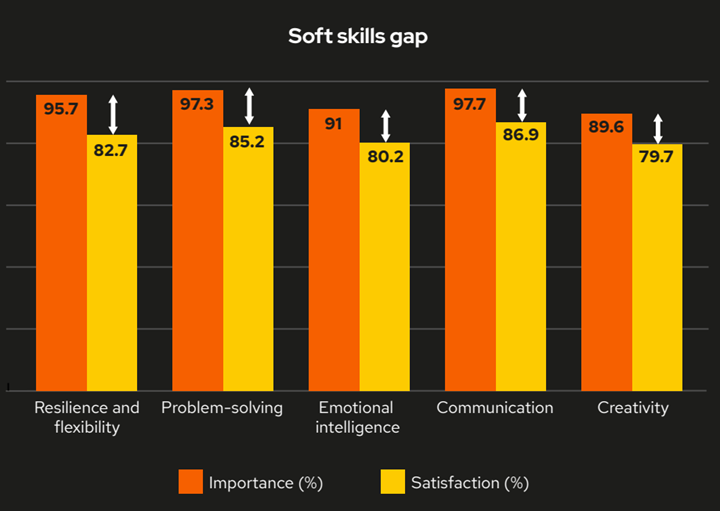
According to a report from McKinsey, 87% of companies expect to experience or already have a skills gap, meaning there is a disparity between the skills they need and the capabilities they find in those they hire.
Business schools are uniquely placed to help bridge the skills gap – using their close ties with industry to develop a curriculum suitable for employers can be a key differentiator compared to industry disruptors offering non-degree based qualifications.
But what are soft skills, and why do employers seek them out?
What are soft skills, and why are they important?
Soft skills, also known as ‘real skills’, are vital in business education. They encompass communication, teamwork and time management and enhance employability, foster effective leadership, and contribute to building a positive personal reputation.
Examples of soft skills
Effective collaboration
- Understanding team dynamics
- Communication skills
Resourceful problem solving
- Analytics and creative thinking
- Depth of subject matter knowledge
Business development and Environmental, Social and Governance (ESG)
- Entrepreneurial negotiation skills
- Business management
- Ethics and social responsibility
The soft skills gap
The largest gap between employers’ perceived importance of a skillset and satisfaction with that skillset is in resilience and flexibility. The shift in educational focus towards equipping students with technical skills, such as coding, data sciences, and analytical skills, might be sidelining softer yet essential skills like resilience and flexibility. The accelerated need for these skills and the potential delay in their integration into business school curriculums may indicate that a more balanced approach between hard and soft skills development is required.

How can business schools address the skills gap?
To address the skills gap, Daniel Kahn, QS Senior Insights Specialist (Graduate Management Education), says:
- Analyse specific gaps: Assess the specific areas where gaps exist between employer needs and current offerings. Evaluate how existing curricula align with the identified critical skills, and determine where enhancements or additions are necessary.
- Engage with industry: Build direct relationships with employers to understand their real-time demands. Collaborate with them to develop courses, workshops, or guest lectures that bring industry insights into the classroom and into their boardrooms.
- Update curricula: Reflect on the skills highlighted as important but lacking. Modify the existing curricula to include these skills, ensuring that graduates are equipped with the competencies that are most valued in the workplace.
- Monitor satisfaction continuously: Establish a system for ongoing communication with employers to regularly gauge their satisfaction with graduates’ skills. Continuous feedback will allow for timely adjustments, ensuring that the education provided remains aligned with industry needs.
- Promote soft skills development: While technical skills are essential, interpersonal skills, communication, and adaptability are also in demand. Implement programmes that foster these attributes, recognising that they are often as crucial to career success as hard skills.
- Personalise skills development: Consider where in the world – or with what kind of organisaiton – a student may be looking for work and encourage them to understand the skills gaps in those regions and how they might gain experience and knowledge in those skills areas.
- Project management: Focus on embedding project management skills into all business curriculums. Schools still have a tendency to favour project management theory over real-world practice. There’s no harm in learning the theory too but the emphasis needs to be on practical experience and skills.
Want to learn more about skills gaps? In our in-depth report, discover:
- The hard skills gap
- The role of AI and the emerging skills gap
- The skills gap in North America, Europe and Asia